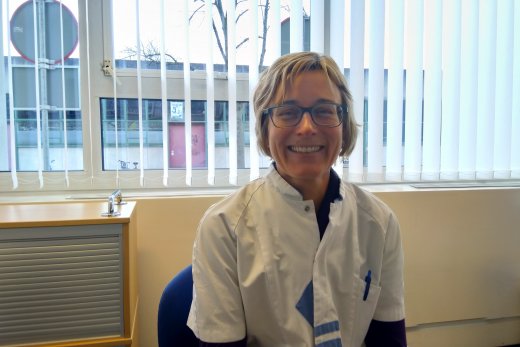23/05/2019
Interview Judith Kreuk: Perspective of an Arthritis Nurse
Judith Kreuk is an arthritis nurse who works at Reade, a center for medical rehabilitation and arthritis, in Amsterdam. SensUs spoke with Judith about her daily activities as an arthritis nurse, trajectories and challenges in treating RA, and her opinion on the SensUs competition.
My name is Judith Kreuk, I am an arthritis nurse, and therefore I treat patients with rheumatoid arthritis (RA), but also patients with other forms of arthritis. I run consultation hours where I see many patients who use adalimumab. These consultation hours include information meetings with new patients and meetings with patients who are sent by the rheumatologist to deepen out how the patient is doing. We also conduct meetings to guide and monitor patients in use of biologicals. In this case, we perform a so called ‘visiting moment’ where several tests are performed, like joint examinations, a blood pressure test, weight and length measurement, and filling in a questionnaire.
Besides the consultation hours, my daily activities are at the day treatment, where arthritis patients come for the biological treatment through infusion. I perform tests and infusions, and ask patients about their wellbeing. Personal contact with patients is an important part of the job.
“We coach and guide patients to regain balance in their daily lives. We are more socially and emotionally involved with patients.”
Generally patients first visit the general practitioner with pain in the joints. In case of returning joint inflammations, the patient will go to the rheumatologist. If the results point out that the patient is suffering from RA, the patient will come in the arthritis care path. During the first year after the diagnosis, patients visit the arthritis nurse and the rheumatologist alternately a couple times a year. Over the past years the amount of contact moments with patients has increased. This development is the result of the limited time of the rheumatologists and the new more social focus in the treatment.
“Some patients who suffered from RA for many years have said to me that they have never been to an arthritis nurse before, only to consultation moments with rheumatologists in the past.”
An important challenge in the treatment of RA is to create a situation where the progress of the disease can be predicted. It is important to know how much adalimumab is needed to inhibit the activity of the disease. Adalimumab is a TNF-alpha inhibitor which blocks the inflammations in the joints. In some cases, the medicine circulates in the blood but does not block TNF-alpha and has no effect. A biosensor can help with fine-tuning the dose to prevent over- or underdosing. Overdosing can lead to side effects such as respiratory tract infections and an increased risk of skin cancer. As adalimumab has not been on the market that long, the long-term side effects are still unsure. Underdosing can lead to more joint damage.
“An important challenge in the treatment of RA is to create a situation where the progress of the disease can be predicted.”
Furthermore, a biosensor could provide insights for the patients in their own treatment. When a patient measures the adalimumab concentration, concludes that it is good and but still suffers from joint pain, the patient can get insights in the fact that he or she might have done a bit too much and take more control over the treatment.
I would like to advise the teams to make sure that the biosensor design is patient-friendly. The teams should determine what extent the patients need to interpret the measurements and take action themselves. For patients who have suffered from RA for a longer period of time and suffer from joint damage, it is important that the device is manageable and patients do not become dependent on their partner to use it. Finally, take into account that not all patients might immediately see the added value of such a monitoring device, as it can be disturbing to be repeatedly confronted with the disease. The SensUs competition can provide added value to healthcare when the interests of the patient are carefully taken into account.

Facebook
YouTube
LinkedIn
Instagram